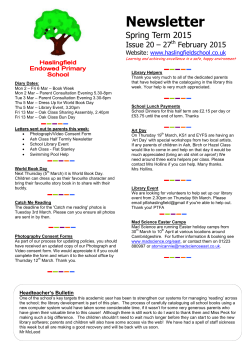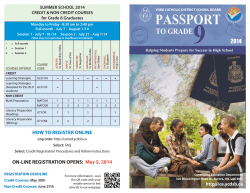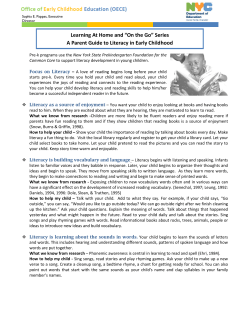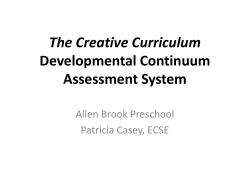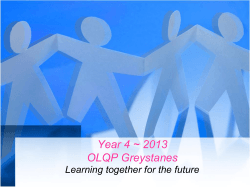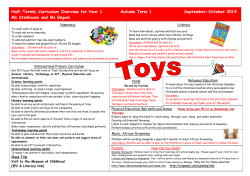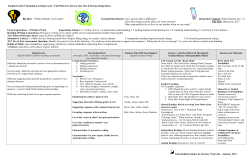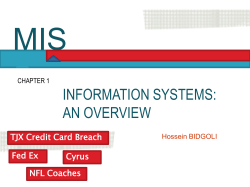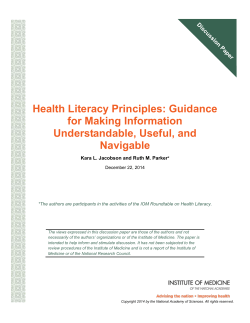
Biology for Science II
Biology for Science II -‐ Biology 1002B -‐ Course Outline 2015 Biology 1002B is required for students in the Faculty of Science who intend to enter into a Biology or Medical Sciences module in second year. Lecturers: Denis Maxwell <dmaxwell@uwo.ca> Lectures: 001 Mon/Wed 10:30 am (NS 145) Tom Haffie <thaffie@uwo.ca> 002 Tue/Thu 10:30 am (NCB 101) Resources: Textbook: Same as 1001A -‐ Biology: Exploring the diversity of life., 2nd Canadian Edition Lab manual: Same as 1001A, must be new for 2014/2015 OWL: <owl.uwo.ca> Course lecture slides, additional lecture resources, grades, general course information. Laboratory and Literacy: Practical and Literacy sessions are mandatory components of this course. If your lab section is listed in this box, La/ 04, 05, 06, 07, 08, 09, 10, 11, 12, 13, 14, 15, 16, 17, 18, 34, 35, 36, 37, 38, 39, 40, 41, 42, 43, 44, 45, 46, 47, 48, 64, 66, 69, 71, 74 If your lab section is listed in this box, La/ 19, 20, 21, 22, 23, 24, 25, 26, 27, 28, 29, 30, 31, 32, 49, 50, 51, 52, 54, 55, 56, 57, 59, 60, 61, 62, 79, 84, 89 you will have Practical 1 the week of Jan 12 and Literacy 1 the week of Jan 19. you will have Literacy 1 the week of Jan 12 and Practical 1 the week of Jan 19. Practical sessions meet in one of three rooms: NCB 309, 310, 320 Literacy sessions meet in one of three rooms: NCB 285, 296, 340 To find out when and where your Practical section meets, consult the Practical tab on OWL To find out when and where your Literacy section meets, consult the Literacy tab on OWL Conflicts/Problems: The first point of contact for all administrative issues in this course is the Biology Course Secretary, Jacqui Griffin. You may contact her by email (fybioadmin@uwo.ca) or in person in Rm 301 NCB. Be sure to use your official Western email account and identify yourself as a student in Biology 1002B. If you have known conflicts or require religious accommodation for labs, literacy or tests, contact Jacqui well in advance. Contact Jacqui as soon as possible if you miss a lab, literacy or test due to illness, accident etc. Written documentation presented to an academic counselor in your home Faculty is required in most cases. See the course OWL site for detailed policy and procedures. Evaluation: Practical (10%) Five practical assignments Literacy (10%) Five literacy assignments Weekend Work ( 5%) Weekly online questions February Term Test (20%) Multiple-choice, collaborative (9:00 to 11:00 am, Saturday, February 7) March Term Test (20%) Multiple-choice, collaborative (9:00 to 11:00 am, Saturday, March 14) Final Exam (35%) Multiple-choice and written, comprehensive, collaborative (TBA, April Exam Period) Lecture Schedule: Lecture topics, slides, independent study readings and discussion forums will be available on OWL in advance of each lecture. Section 001 (Mon/Wed) lectures are repeated for Section 002 (Tues/Thurs); students may attend either section. Lecture screenshots with audio will be captured and posted to OWL as Archives. Week of Lec # Jan 5 Jan 12 Jan 19 Jan 26 Feb 2 1 2 3 4 5 6 7 8 9 10 Lecture Outline Evolution of Solar Powered Life A series of classes will look at the evolution of the ability to capture light as energy and information for life. Specific topics will include the biochemistry and cell physiology of photoreception, integrated thermodynamics of energy flow as well as endosymbiosis and lateral gene transfer. These classes will showcase the single-celled alga, Chlamydomonas. Saturday, Feb 7 Feb 9 Instructor 11 12 Denis Maxwell February Term Test (9:00 to 11:00 am) Evolution of Death Tom Haffie Feb 16 Conference Week (no lectures, practical, or literacy sessions) Feb 23 Mar 2 Mar 9 13 14 15 16 17 18 These classes will highlight the structure and function of genes and genomes in the context of the evolution of multi-cellularity and programmed cell death (apoptosis). Specific topics will include fundamental signals important in gene expression in prokaryotic vs. eukaryotic cells, as well as emerging insights into regulatory networks, epigenetics, stem cells, comparative development and cancer. Saturday, Mar 14 Mar 16 Mar 23 Mar 30 Apr 6 19 20 21 22 23 24 25 Tom Haffie March Term Test (9:00 to 11:00 am) Special Topics This final series of classes will extend the fundamental principles established early in the term. Topics may include Elyssia (the amazing solar-powered sea slug), aging, circadian rhythms, evolution of colour vision, experimental evolution and life as an expression of self-organized complexity. Denis Maxwell & Tom Haffie Comprehensive Final Exam (Date and Time TBA) Note that this version of the Course Outline is a summary only. You should become familiar with the official course policies, procedures and deadlines as described in more detail under the Policy and Admin tab on the course OWL site.
© Copyright 2025
